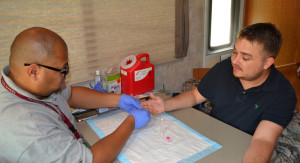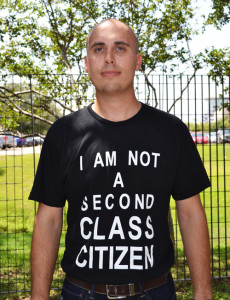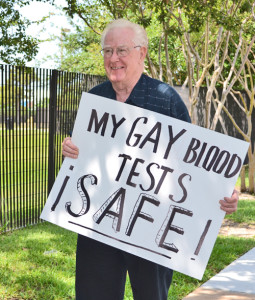
Gay blood drive brings attention to FDA ban
by Megan Smith
Photos by Aisha Bouderdaben

For over thirty years, the U.S. Food and Drug Administration (FDA) has been sending the message that gay blood is bad blood, LGBT rights activists argue.
Friday marked the first-ever nationwide blood drive demonstration to call attention to the FDA ban that prevents gay and bisexual men, commonly known as MSM donors, from donating blood. The ban, which was established in 1983, states that any man who has had sexual contact, even once, with another man since 1977 cannot ever donate blood.
Ryan James Yezak, a native Houstonian who organized this nationwide event as a part of his project Second Class Citizens—a feature-length documentary that takes an all-encompassing look at discrimination based on sexual orientation—emphasizes that this ban is archaic and perpetuates the negative stigma surrounding gay and bisexual men and HIV.
“We didn’t have the HIV testing capabilities we do now,” Yezak said in a YouTube video announcing the event. “It is outdated, and as a result, countless otherwise eligible gay and bisexual men are unable to contribute to the nation’s blood supply and help save lives—especially in a time when blood shortages are increasingly common.”

The gay blood drive demonstration took place in fifty-three locations across the country. Houston’s event was held at the Gulf Coast Regional Blood Center.
Each participant who arrived at the event was first tested at a mobile HIV testing unit using rapid HIV tests that provide results in only twenty minutes. Participants then entered the center to attempt to donate blood. As these MSM donors were rejected, coordinators from the event collected their HIV test results to send to the FDA to visually convey how much of an impact these donors could have on the blood supply, if they should lift the ban.
Jonathan Stansbury, a friend of Yezak and a participant in the Houston event, was tested onsite for HIV—his results were negative. “I’m an STD-free male and I want to do my part to change this discriminatory regulation,” he said.
However, when Stansbury attempted to donate blood inside the center, he was still denied. “I went through the whole process of answering all the questions before trying to donate, and once I answered yes to having had sexual contact with a man, they asked me very personal questions, like when was the first and last time I had sex with a man,” he said. “If they were just going to deny me, why did they need to know such personal information?”
By 12 p.m., a total of five participants had been tested and attempted to donate blood. The hope was to have twenty to twenty-four participants by 5 p.m. at the Houston location to help fulfill their goal of 1,000 participants nationwide, according to Kyle Yezak, coordinator of the Houston event.

The campaign was properly coordinated and very helpful in making sure it would not disturb the center’s normal processes, Dr. Beth Hartwell, Gulf Coast Regional Blood Center medical director, said. Hartwell also noted that the center believes the FDA should modify the ban to only prevent men who have had sexual contact with other men in the past year from donating blood. “We support the joint statement that has been made by the American Association of Blood Banks, America’s Blood Centers, and the American Red Cross to revisit that ban and to modify it,” Hartwell said.
Tim Campbell, an openly gay 73-year-old Houstonian, has experienced the impact of this ban for a long time. A community activist since the 1970s, Campbell has been attempting to donate blood for more than three decades—and has always been denied. “They were not only treating me as a second-class citizen, but making me treat myself like a second-class citizen by asking me to automatically defer,” Campbell said.
Overall, organizers hope the event’s end results make a big impact on the FDA. “This is not a protest,” Ryan Yezak said. “This is not meant to be political. This is a demonstration of peace, of love, of being a human being.”
Megan Smith is a regular contributor to OutSmart magazine.











Comments